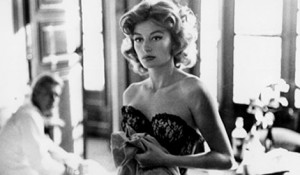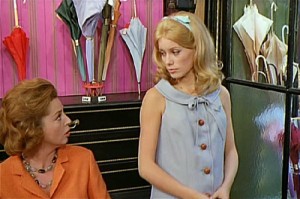STUDIO: Criterion | DIRECTOR: Jacques Demy | CAST: Catherine Deneuve, Anouk Aimee, Michel Piccoli, Jeanne Moreau, Francoise Dorleac, Dominique Sanda
RELEASE DATE: 7/22/14 | PRICE: Blu-ray/DVD Combo $124.95
BONUSES: Vintage interviews, documentaries, four shorts by Demy, restoration demonstrations
SPECS: NR | 573 min. | Foreign language drama-musical | 2:35 (Lola, Young Girls)/1:66 (Bay of Angels, Donkey Skin, Chambre)/1:85 (Umbrellas) | monaural (Lola, Bay)/5.1 Surround (Umbrellas, Young Girls, Donkey Skin)/2.0 Surround (Chambre) | French with English subtitles
RATINGS (out of 5 dishes): Movie
| Audio
| Video
| Overall
Since Jacques Demy’s death in 1990, his wife Agnès Varda – herself a master filmmaker – and his children Rosalie and Mathieu have done their best to keep his films in distribution, not only in France but around the world. The latest step in the Demy-Varda campaign of familial devotion is this “greatest hits” 13-disc (7 DVDs and 6 Blu-rays) box of his films from Criterion.
Five of the films in this set are classics of Sixties French cinema. The sixth (Une Chambre en Ville, 1982) is more of a subject for debate, but it shares sumptuous production design and an odd mixture of whimsy and melancholy with the other films.
The classic quintet exhibits all of the filmmaker’s singular talents. His first and second features, Lola (1961) and Bay of Angels (1963), are his most “New Wave” creations. Demy’s similarities to, and differences from, his contemporaries in the nouvelle vague are explored at length in the supplements here. There is no denying, however, that the visual approach, subject matter, and rampant cinephilic references in his first two B&W features represent the closest he came to the work of his friends Truffaut, Godard, Rivette and, of course, Varda (who was the first of the core New Wave filmmakers to make a feature, La Pointe Courte in 1955).
The next three films included here are Demy’s masterpieces. Each one a musical starring the very unmusical Catherine Deneuve (Potiche, Belle de Jour) – who, like all of the cast members, lip-synched to the voice of a professional singer – this unofficial “trilogy” comprises Demy’s key cinematic legacy.
The films are very different, with Umbrellas of Cherbourg (1964) being the most impressive achievement. Co-written by Demy and composer Michel Legrand as a “jazz opera,” the film is also a wonderful melodrama that retains its power to astonish, amuse and move viewers. One of the many notable things about the movie is that it is a musical that doesn’t “stop” for set-piece songs (as all the dialogue is sung), although its major theme became the “middle of the road” standard “I Will Wait for You” (also nominated for a Best Song Oscar).
Each of the films in this set comes with interesting supplements, but the materials included with the Legrand-Deneueve musicals are the most integral for an understanding of the films. Footage from French TV documentaries show Legrand and Demy working hand-in-glove on Umbrellas and Young Girls of Rochefort (1967). A 2008 hour-long docu on Umbrellas provides historical context for the film’s plot and also features candid interviews with the participants. In a new featurette created for the set, critic Rodney Hill discusses how Demy adhered both to the tenets of the New Wave and the “tradition of quality” that they publicly decried.
In a vintage interview excerpted in the Umbrellas docu, Demy maintains that his goal for the film was to “make people cry.” His next film, Young Girls of Rochefort is a more conventional, pastel-colored, musical that he made with the desire (revealed in another interview included here) to make people dance out of the theater. The film is indeed one of Demy’s most “extreme” musicals, in that he clearly set out to create both a self-contained world of romantic longing and a heartfelt tribute to his favorite American musicals. The latter aspect is reinforced by the presence of Gene Kelly (Singin’ in the Rain) – whom Demy sadly decided to dub in French, even though Kelly clearly is speaking French onscreen.
Of all the extras included in this overstuffed box, perhaps the most eye-opening is a half-hour episode from a six-part Belgian TV documentary about the film’s production. In this installment, the splendid work of production designer Bernard Evein is the focus, but the most interesting moment occurs when something goes wrong with Deneuve’s dress and she throws a little tantrum (a somewhat quiet tantrum, given that TV cameras are in the room).
We then see Deneuve’s costar, her real-life sister Francoise Dorleac (who tragically died in a car accident shortly after Young Girls was completed), left on her own to complete her part of the afternoon’s shooting. At that point, we have not only seen one of France’s biggest stars get really angry, but we then witness Dorleac singing the score in English – there was clearly an English-language version of the film, with alternate lyrics for each song. That version has seemingly “disappeared” in the sands of time. (There is no alternate audio track here for Young Girls.)
Demy’s next film, a 1969 American reworking of Lola called Model Shop, isn’t included here (it was released on DVD by Sony). That film and his other English-language feature, The Pied Piper (1972), are the only excellent Demy films that are absent here. A complete Demy retrospective toured the U.S. last year, letting viewers over here see his later “missing” films from the Seventies and Eighties, which are either sadly misguided or contain a sole exceptional scene or two.
The next film included here is the last entry in his Deneuve musical trilogy, Donkey Skin (1970). Based on a French fairy tale, the film is odd yet thoroughly endearing – a blend of Cocteau-like visuals and Legrand’s somewhat Vegas-y songs (by ’70, his work had spawned some nightclub evergreen tunes, a fact that transformed his songwriting).
The extras included with this film include vintage TV interviews in which Demy is seen saying he “wasn’t pleased” with Young Girls because it went “in a certain unrealistic direction” (for which the solution was evidently to make a full-blown fairy tale!). There are also two featurettes devoted to the original fairy tale, which is both a playful variant of Cinderella and a kinda creepy tale of incest – in the film, the King played by Jean Marais (Beauty and the Beast) wants to marry his daughter, played by Deneuve.
The final entry here, Un Chambre en Ville, is indeed a problematic Demy film – a beautifully designed “political” musical that winds up being an overblown melodrama suffering from a very forgettable score (Michel Colombier sat in for Legrand on this occasion). Thankfully the extras that come with this film are the most indispensable in the whole package. Foremost among them is a fascinating 1987 interview from Finnish TV that finds Demy reviewing his career and openly discussing how he hasn’t been able to find backing for a few of his projects.
James Quandt’s hour-long documentary “Jacques Demy, A-Z” is the single best “101” about Demy’s work, reviewing all of his themes, obsessions, influences, and colleagues. Also included are two of the three films Varda has made about her husband, the docus The Young Girls Turn 25 and The World of Jacques Demy.
The Young Girls docu is charming but comes across as what it is here, a DVD extra. The World… is a beautifully heartfelt tribute to Demy in which Varda reviews his life and career, conveying her love for her late husband in nearly every frame. Her efforts at preserving his legacy have certainly succeeded — she and her children can be very proud of this vastly entertaining and information-packed box set.
|
Buy or Rent The Essential Jacques Demy
|
|||
|---|---|---|---|
Blu-ray/DVD Combo |
 Blu-ray/DVD Combo Blu-ray/DVD Combo |
 Blu-ray/DVD Combo Blu-ray/DVD Combo |
|


Leave a Reply